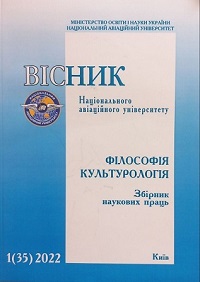TIME AND BEING IN SENSITIVE MODELS OF THE TRADITIONAL EAST AND POSTMODERN WEST
DOI:
https://doi.org/10.18372/2412-2157.35.16541Keywords:
time, being, Byzantine time, traditional Eastern culture, Postmodern, postmodern Western culture, nstantaneous, fluidity, changeAbstract
Introduction. Postmodernism is a new form of self-consciousness of Western man in which it is part, of what can happen to it, which is not the case with the East because there man "yesterday" was self-aware and understood the true state of affairs. In the Eastern
tradition, we can see certain phenomena that have long been perceived and understood by the East as self-evident and which the West approaches only at the expense of the formation of a postmodern model of worldview. The aim of the represented intelligence is to consider the contextual features of the concepts of time and existence rooted in the Eastern tradition (in the example of Japan) and irrational postmodern Western culture. The tasks of the study are the following: to analyze the specifics of time and being in the Eastern (Japanese) tradition and postmodern Western culture and to highlight their points of intersection and prove that these cultures are not radically opposite. Research methodology of the work is the methods of analysis and interpretation. Research results. Based on the explanations and interpretations that exist in the Eastern Japanese tradition about time and being, we see that they are focused on perceiving variability, fluidity, and being "at the moment" as certain principles of life itself. Change is the fullness of life, and accordingly, capturing this fullness can be primarily by capturing beauty in a fluid, volatile and short-lived. Thus, in the semantic model of the eastern Japanese culture of being, which manifests non-being (which, in turn, contains all the potential fullness of things) and acts as a manifestation of non-being, and time appears as a manifestation of change. In the Western semantic model, Postmodernism itself is already a manifestation of change. Discussion. For Westerners, Japanese culture has always been something mysterious, enigmatic, seductive, and unimaginable. The principles of understanding the fluidity of everything, the constancy of change, and the ephemerality of nature are embedded in this traditional culture. It can be argued that the Eastern Japanese tradition in the understanding of time tends to the possibility of maintaining a balance in continuous interaction with the outside world and ever-changing conditions. This tradition accepts variability unpretentiously and not suffering, but as a given (otherwise, it is not possible). «To be» for the Japanese means to be completely immersed in their own existence, and also means to be present here and now, being directly in the only moment of the present, in the spatial framework in which existence is manifested. Thus, "to be" from the standpoint of the Japanese mentality means to exist as second-hand self-actualization by constantly creating a "relationship" between man and the environment. Conclusion. Summing up all the above, it should be recognized that all that the Eastern tradition has carried for centuries, for the West is just a glimpse of the «sun» in the form of postmodern culture..
References
Deleuze, G. (1983), Cinéma 1. L'Image-Mouvement, Р. Les Éditionsde Minuit, 296 р.
Абэ Кобо (1988). Запад-Восток : встреча культур / Кобо Абэ; пер. с яп. Б. Никольского. – Иностранная литература. – 1988. – № 9. – С. 203-205.
Мозгова Т. А. Контекстуальні особливості концепту «буття» в японській культурній традиції / Т. А. Мозгова // Філософські обрії : наук.-теор. Журнал. Ін-т філософії ім. Г. С. Сковороди НАН України; Полтавський держ. пед. ун-т ім. В. Г. Короленка. 2012. Полтава, Вип. 28. – С. 15-23.
Мозгова Т. А. Контекст «логіки небуття» в японській культурно-філософській традиції / Т. А. Мозгова // Вісник Харківського національного університету імені В. Н. Каразіна. № 1039. Серія : Філософія. Філософські перипетії. Харків, Вип. 47. – С. 112-116.
Мозговая Т. А. Небытийная природа времени в японской духовной традиции / Т. А. Мозговая // Вестник Воронежского государственного университета. Серия: Философия: сб. науч. тр. Воронеж, № 2(8). – С. 152-157.
Мураками Харуки (2009) Норвежский лес / Харуки Мураками; перевод: А. Замилов. – М. :Эксмо ; СПб.: Домино. – 368 с.
Сартр Ж.-П. (2012) Бытие и ничто: опит феноменоло-гической онтологии / Жан-Поль Сартр ; пер. с фр. В. И. Колядко.
М. : АСТ: Астрель. – 925 с.
Хайдеггер М. (2002) Бытие и время / М. Хайдеггер. СПб.: Наука. – 447 с.
Published
Versions
- 2023-07-20 (2)
- 2022-08-12 (1)

